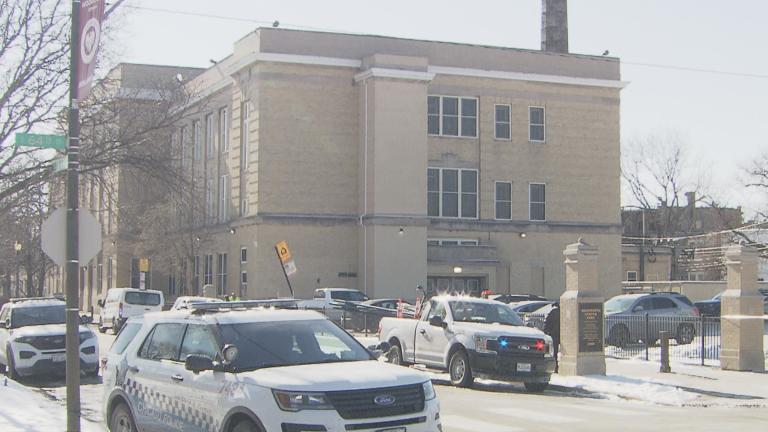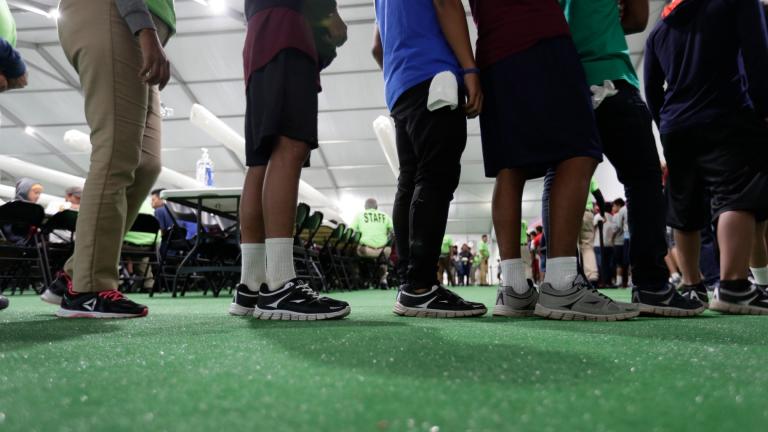 A vacant lot at 38th Street and California Avenue in the Brighton Park neighborhood is the proposed site of a winterized base camp for migrants. (WTTW News)
A vacant lot at 38th Street and California Avenue in the Brighton Park neighborhood is the proposed site of a winterized base camp for migrants. (WTTW News)
Chicago officials on Thursday renewed their pleas for help from the federal government to assist in caring for the more than 19,000 people sent to Chicago from the southern border in the past 15 months. The city is awaiting test results before finalizing a decision to build a massive “winterized base camp” in Brighton Park.
Cristina Pacione Zayas, Mayor Brandon Johnson’s first deputy chief of staff, said city officials were pleased that President Joe Biden had sent a request to Congress for an additional $1.4 billion for state and local governments providing food, shelter and medical care to the migrants, who are all in the country legally after requesting asylum but are not allowed to work without special permission.
But the need will be closer to $5 billion, Pacione Zayas said, and Chicago officials will work to get as much of those funds as possible.
“The president is going in the right direction,” Pacione Zayas said during a virtual briefing with reporters.
However, there is no guarantee that those funds will be approved by Congress, and it’s not known when they could start flowing to Chicago.
City officials also asked the Biden administration to appoint a single official to coordinate with the cities and states caring for the migrants to streamline efforts to help them, Pacione Zayas said.
In addition, Chicago officials want the federal government to allow federal land and buildings, including military bases and training facilities, to be used to house the migrants.
Biden agreed in September to allow thousands of Venezuelan migrants to work in industries facing labor shortages, offering them a path out of city-run shelters and police stations.
But Chicago needs assistance from lawyers to help migrants apply for work permits, and officials said the fees associated with those applications should be waived. City officials also support changes in federal law to allow all undocumented immigrants to work legally and efforts to speed the resolution of requests for asylum, Pacione Zayas said.
According to Pacione Zayas, officials have yet to make a final decision on whether to build a massive “winterized base camp” on a vacant lot near 38th Street and California Avenue to house some of the approximately 3,300 men, women and children who are sleeping on the floors of police stations across the city and at O’Hare International Airport as of Thursday.
While officials said the site appears to be a viable location for a temporary shelter, they are still awaiting the results of environmental tests before making a final decision, Pacione Zayas said. Initial plans called for the base camp to house families with children in soft-sided “yurt” structures with 12 beds, but city officials have the flexibility to arrange the base camp as they see fit to best meet the needs of the residents, Pacione Zayas said.
Pacione Zayas acknowledged that the crowd at Tuesday’s community meeting about the base camp was starkly divided along racial lines, with many of the most vehement and emotional pleas to scrap the plan coming from Asian Chicagoans. Some Asian Chicagoans briefly chanted “send them back” as officials spoke about the plan Tuesday.
Those tensions will continue to grow until Chicago gets additional help from the federal government, Pacione Zayas said. That makes Chicago’s renewed request for help even more critical, she added.
Pacione Zayas also defended the Johnson administration’s decision to renew its contract with Favorite Healthcare Staffing with a $40 million extension through October 2024.
That firm staffs the city’s migrant shelters under an initial deal signed by former Mayor Lori Lightfoot. Since taking office, Johnson has frequently vowed to cancel that contract, which he has said is far too expensive and wasteful.
However, as new contracts work their way through the city process, officials had no choice but to extend the contract to ensure the shelters can continue to operate but at a reduced cost to taxpayers after the deal was renegotiated, Pacione Zayas said.
Contact Heather Cherone: @HeatherCherone | (773) 569-1863 | [email protected]








